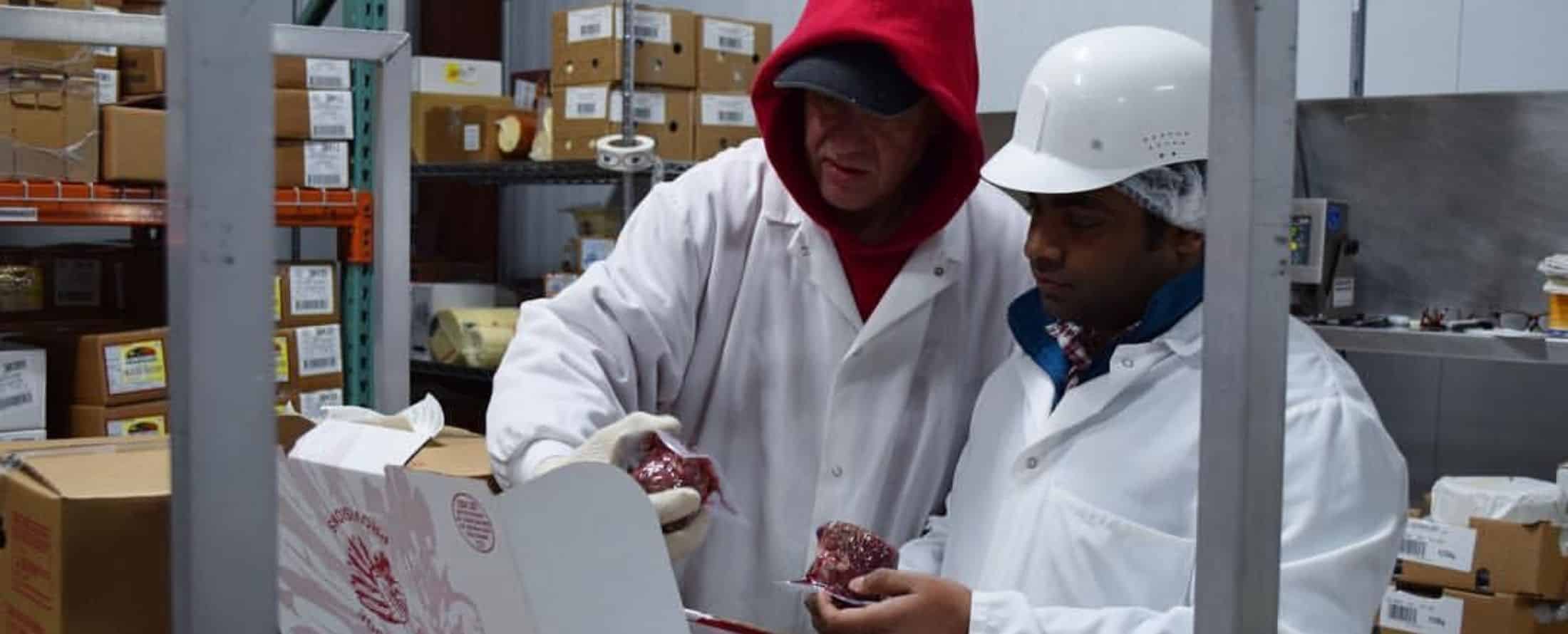For Blair Hinderliter, going digital started with a simple mission—to reach and connect with their frontline production employees at IRP Meat and Seafood Co., a food service distributor that specializes in high-quality proteins.
“We’re a family-owned business. We want to treat our employees like family. This means we need to be able to communicate with them easily.”
Blair had worked for other companies before coming to work as the Chief of Staff at IRP Meat and Seafood Co., a company his father started in 1983. He soon saw that IRP Meat and Seafood Co. had a large, diverse frontline workforce that required a different communication strategy.
“I had always worked in office spaces where everyone was either a phone extension or email away, whereas here when I go back into production—which is where a majority of our workforce is—they’re standing either at a cutting block or packaging machine all day, never in front of a computer,” Blair said.
He needed a mobile-first solution and chose Beekeeper to create a more effective way to communicate. But once the digital transformation happened, he quickly saw that Beekeeper had several operational benefits as well.
Connecting Frontline Workers
“Maintaining communication is very important to me, and it’s important to the organization as a whole.”
Before Beekeeper, communication with frontline workers consisted of bulletin board postings, notices stapled to paystubs or physically going back to the food processing area to talk to them. The problem with this final method? Office personnel had to suit up in hairnets and lab coats before they could enter the food processing area.
Feeling that these traditional methods were outdated, Blair upgraded to a digital communication platform to connect his entire workforce in one place, in real time—from the front office to the frontlines. Instead of tracking down employees in person he now sends direct or group messages to his team. For instance, when it’s open enrollment time, he uses Beekeeper’s confirmation campaigns to remind employees.
Connecting with his team wasn’t simply about work, though. IRP Meat and Seafood Co. is a family-owned and operated business. They were even recognized as 2018’s “Multi-Generational Family Business of the Year” by the Philadelphia Inquirer.
“As a family-run business, we try to treat everyone here like family.” Beekeeper helps cultivate a friendly, casual atmosphere that fosters relationships to strengthen collaboration and cooperation.
“I think it’s important that it’s not always just communication about benefits or safety issues. There’s more casual communication about all types of things, from wishing somebody a happy birthday to ‘hey I just wanted to check in and see how your week is going.’”
Real-Time Communication and Better Customer Service
IRP Meat and Seafood Co.’s primary customers include restaurants, hotels, and country clubs. Often, they order food that needs to be delivered the next day, a service known as JIT, or “just in time.” Customers can also make changes to existing orders through the next business morning.
Before Beekeeper, the ordering process was complicated. The sales rep would get an order, relay the information to the in-house sales team who would then pass it to the processing team. If an item was out of stock, that communication would then travel back the same way. This slow communication chain impacted end-to-end efficiency in this time-sensitive industry.
“Now we have television monitors posted in the meat production room, the poultry production room, and the seafood production room, and those stocks and substitutes are communicated through a Beekeeper group message.”
With Beekeeper, frontline workers post out-of-stock items into communication streams that reach the sales reps right away. The sales rep can then reply instantly to accommodate the order immediately. “The whole production room can look up at that and see it in real time.”
This digital communication has improved operations by:
- Creating a streamlined workflow with little room for miscommunication
- Enabled greater consistency in customer expectations, delivery, and service
- Reducing waste due to receiving order changes before cutting and prep begins
- Improving the ability for on-time deliveries for customers who rely on quick turnarounds
Business Continuity Through a Crisis
In the past, IRP Meat and Seafood Co. has relied on a phone tree to relay urgent messages to their more than 100 employees. That was when a crisis was usually a bad snowstorm that shut the company down for a day. Now, in the face of an ever-changing pandemic, Blair has had to pivot his communication strategy, which has been easier to do with a digital platform.
When COVID-19 first hit and IRP’s customers experienced an immediate downturn in their own business, Blair was forced to furlough some of his staff (which have since been brought back to work). During this time, Blair relied on Beekeeper to connect with employees. He kept them updated on reopening and shared pertinent information like how to file for unemployment.
This ability to communicate helped maintain business continuity during their downtime and create a seamless transition as business picked up and employees started to return. “I was able to bring back most of our staff fairly quickly and I did that through Beekeeper,” he said. “It was definitely my primary source of communication with team members when they weren’t here.”
Blair appreciated being able to connect with his team over the app where he could use the read receipt feature to make sure his communication was opened rather than a phone call. “I think it’s more convenient for everybody and less intrusive.”
Now that most of the frontline team at IRP Meat and Seafood Co. has been brought back onboard, Blair is constantly updating his workers on corporate- and government-mandated policies such as temperature checks, wearing masks (and how to wear them properly), and staggering break times between departments to avoid too many people gathered at one time.
Making Safety Information Accessible to All
Food production can be a fast-paced industry, especially in a company like IRP that has a fast turnaround from procuring to prepping to delivering products. Workplace safety is a top priority at IRP. They’ve used Beekeeper to coordinate safety information and training.
As part of their safety protocol, IRP Meat and Seafood Co. also runs drills to make sure everyone knows what to do and where to go in an emergency. These protocols and maps of where to stage are shared in the digital workplace and easily accessible to all employees.
“All of that has been posted on Beekeeper. And when we do an annual safety drill, I give them a heads up that it’s coming on Beekeeper.”
Maintaining a Solid Company Culture
One of IRP Meat and Seafood Co.’s core principles is, “To foster a safe workplace where employees have an opportunity to succeed and advance.” But it also means creating a workplace that fosters a sense of camaraderie.
From office Olympics that were scheduled for this summer to a family day at a local minor league ballpark, there’s no shortage of fun activities at IRP. Relationships built on the workplace app make those in-person events even more fun, with no awkward icebreakers. “All of those in-person things were due to Beekeeper and being able to announce it,” Blair said.
With all of those fun, in-person team-building activities postponed until large gatherings are once-again safe to hold, IRP Meat and Seafood Co. is maintaining a solid company culture through online connections over their digital workplace.
“I’m constantly thinking of ways to engage people through Beekeeper to make sure they’re still using the app.”
While IRP Meat and Seafood Co. has streamlined communication, they’re continuing to realize the operational benefits of Beekeeper. Through their digital workplace, Blair and his team have been able to successfully build a more unified workforce that is informed, connected, and engaged.





